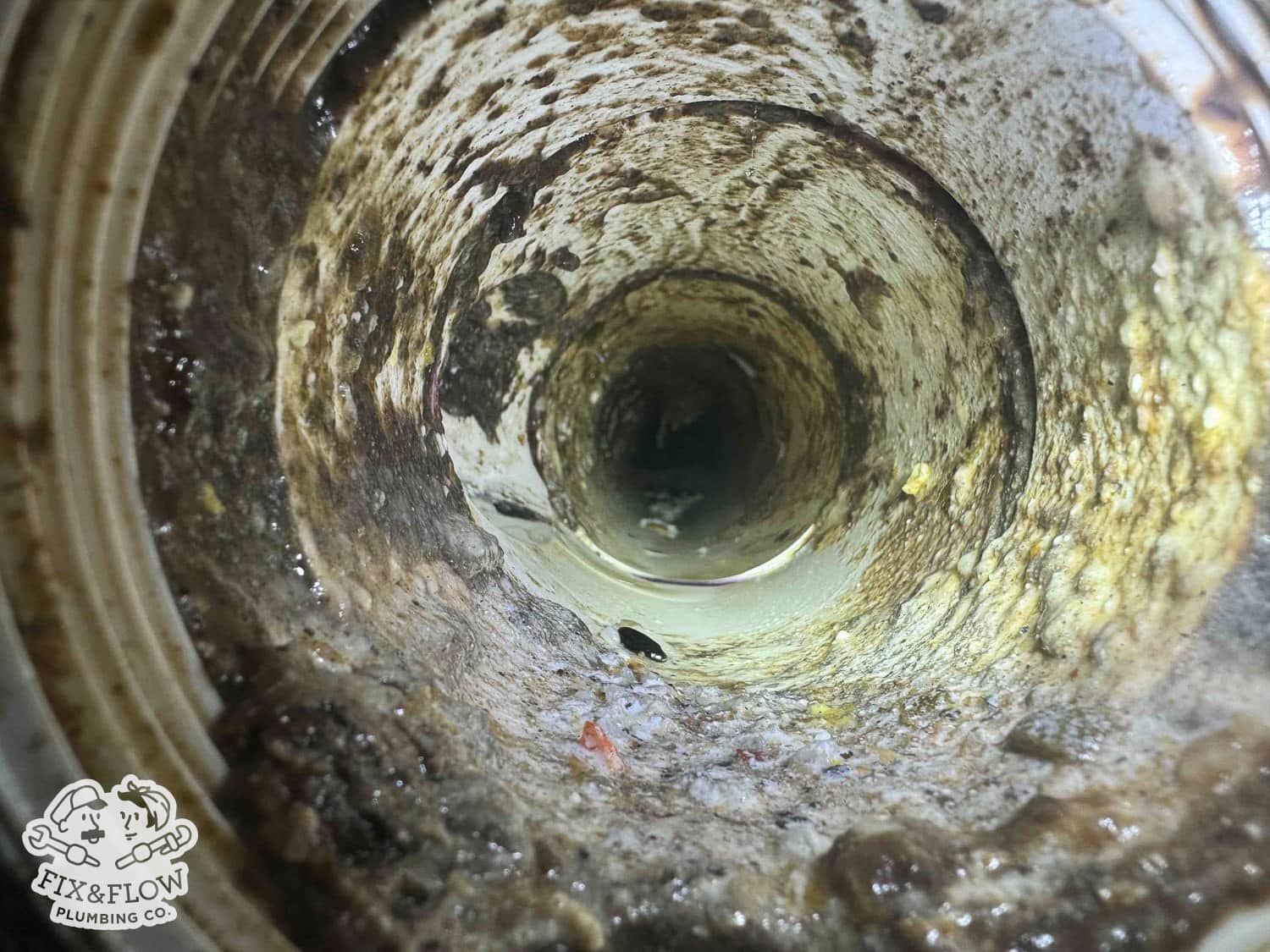What Does It Mean When a Drain Gurgles After Flushing?
That bubbling or gurgling sound occurs when air can’t properly move through your plumbing system. Normally, air flows freely through vent pipes that extend from your plumbing to the outdoors. But if something blocks that air—like a clog, buildup, or damaged vent—it gets trapped, creating suction that pulls air and water in strange ways.
In short, the gurgle means your plumbing system is struggling to breathe.
Top Causes of Gurgling Drains After Flushing
1. Clogged or Blocked Drains
The most common reason for gurgling is a partial blockage in your pipes. Over time, buildup from grease, soap, toilet paper, or hair can restrict flow. When you flush, water pushes past the clog, creating pressure and forcing air back up through nearby drains—producing that gurgling noise.
If multiple drains are affected, it could indicate a blockage in the main sewer line. In that case, professional sewer and drain cleaning is the safest solution.
2. Blocked Plumbing Vent
All plumbing systems rely on vent pipes to equalize pressure. These vents usually exit through your roof. If the vent becomes blocked by debris, a bird’s nest, or even leaves, air pressure builds up in your drains. As water flows through, the imbalance causes a bubbling or gurgling sound.
According to the EPA, proper venting is essential for safe, efficient plumbing and to prevent sewer gases from entering your home.
3. Main Sewer Line Problems
Tree roots, collapsed pipes, or old corroded sewer lines can all cause airflow and drainage issues that result in gurgling. If the noise happens when you flush and affects multiple fixtures, your main sewer line may need inspection or repair. Sewer issues require prompt attention to prevent sewage backups and costly property damage.
4. Poor Plumbing Design or Remodel Work
If your home has been recently remodeled—especially with added bathrooms or fixtures—your plumbing vents may not have been properly configured. Inadequate venting can lead to recurring gurgles after flushing. Our licensed plumbers can identify venting issues during a plumbing inspection and recommend code-compliant solutions.
5. Septic Tank Issues
Homes not connected to city sewer systems can experience gurgling drains when their septic tank is full or failing. A saturated drain field or buildup in the tank restricts water flow and causes air to escape through household drains. Septic systems should be inspected and pumped regularly—usually every 3 to 5 years.
Is Gurgling Dangerous?
While gurgling itself isn’t dangerous, it’s a warning sign that shouldn’t be ignored. Ignoring pressure imbalances or slow drainage can lead to:
- Sewage backups and contamination
- Leaks from over-pressurized pipes
- Foul odors entering your home
- Costly structural or water damage
Think of it as your home’s plumbing “check engine light.” Fixing it early is faster, cheaper, and much less messy than waiting until it turns into an emergency.
How to Troubleshoot a Gurgling Drain
1. Try Clearing the Drain
If the gurgling is localized to one sink or toilet, you can try using a plunger or safe enzymatic drain cleaner (avoid harsh chemicals—they corrode pipes). If that doesn’t work, the clog is likely deeper and requires professional equipment.
2. Inspect Your Roof Vent (Safely)
If you can safely access your roof, check that your vent stack isn’t obstructed. Use a flashlight to look for debris, leaves, or bird nests. Never use tools that could damage the vent pipe. If you’re unsure, a professional can perform a camera inspection to locate obstructions.
3. Schedule a Professional Inspection
When the source isn’t obvious, it’s time to call a professional. Fix & Flow uses non-invasive inspection tools and advanced equipment to diagnose the issue accurately—whether it’s a venting problem, clog, or damaged pipe.
Preventing Gurgling Drains in the Future
- Schedule annual plumbing inspections
- Install a water filtration system to prevent mineral buildup
- Avoid flushing wipes, grease, or debris down drains
- Have your drains professionally cleaned at least once a year
- Monitor for slow drains, which often precede gurgling sounds
According to Energy.gov, maintaining your plumbing systems proactively saves both water and energy costs over time—and helps prevent emergency repairs.
Why Call Fix & Flow Plumbing Co.?
We’re not just plumbers—we’re your local Intown Atlanta plumbing experts. From toilet repairs and faucet installations to water heater replacements and gas leak detection, our team handles it all with precision and care.
We use cutting-edge technology, clear communication, and upfront pricing—no surprises, no mess. So if your drain is gurgling or bubbling after flushing, we’ll find the source and fix it fast.
Contact Fix & Flow Plumbing Co. today to schedule a same-day inspection or repair. We’ll make that gurgle go away—for good.
Frequently Asked Questions
Why does my drain gurgle every time I flush the toilet?
The gurgle happens when air gets trapped in your plumbing system. This usually means a clog, blocked vent, or partial sewer line obstruction is preventing air from flowing normally.
Can a gurgling drain fix itself?
Not likely. The issue may seem to disappear temporarily, but the underlying cause—like buildup or poor venting—will continue to worsen over time. It’s best to have it inspected professionally.
How do I know if it’s a sewer line problem?
If multiple drains gurgle or you notice slow drainage and odors from several fixtures, your main sewer line could be partially blocked or damaged. A sewer camera inspection can confirm it.
Is it safe to use chemical drain cleaners for gurgling drains?
No. Chemical cleaners can corrode pipes and worsen blockages. It’s better to use a plunger, enzyme cleaner, or call a professional plumber for a safe and permanent solution.
